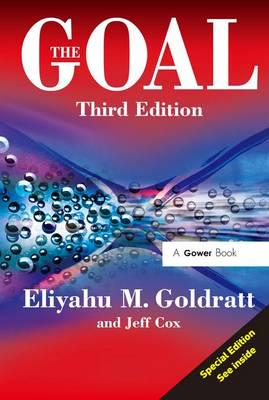Cranfield Book Review: The Goal (Third Edition) by Eli Goldratt, 2016
07/08/2018

“Seems to me there’s a world of difference between ‘Common Practice’ and ‘Common Sense’”, Julie Rogo.
No, this is not a book about how well England fared in this summer’s World Cup! This is a seminal work on why you need to understand how the flow of work through any real-world system impacts on customer experience, profitability (in the private sector), efficiency and effectiveness. First published in the 1980s, it has been updated several times since, and the Third Edition contains a paper written in 2008 titled: “Standing on the Shoulders of Giants”. It is unique in that it tells the story of a plant manager Alex Rogo and his trials and tribulations and counter-intuitive learning in how to positively make impacts on the four areas above.
And, yes, it is a story about massive improvements made at a manufacturing plant – but it does not take a genius to read-across into a services environment.
Rather than a precis of the book, I’m just going to jot down some simple messages that jump out of the book, for me at least…
You have to have a clear Goal (or Purpose, or WHY?), and it needs to be right!
You do not balance Capacity (or Resources) against Demand – this has been tried and continues to fail since the 1980s. You balance Flow (of work) against Demand, visualising “Work in Progress” (some refer to backlog, work-stack – it’s just stuff working its way through the system).
And the above is true because you have a series of linked dependent events, and there is a mathematical principle that you cannot contradict that states variation gets worse and worse as you pass through each stage in a process consisting of these events. And there’s a very simple experiment you can run to demonstrate this!
Challenge Common Practice carefully – it fights back, particularly when you use Common Sense.
Don’t run non-bottleneck resources flat out – run the whole system Flow according to the rate at which work can get through the bottleneck.
Once you have identified the bottleneck and stabilised it (i.e. it does not jump around between different areas, locations, departments etc.), work on reducing the impact of that bottleneck.
Work on the whole system end to end including the customer (the public at large, the communities we serve).
You need to move from a cost-accounting world to a throughput-accounting world.
Establish a clear link between actions (what you want people to do), and meaningful measurement of those actions and their impact back to the Purpose / Central intent of the organisation.
Don’t jump to conclusions (solutions – especially solutions devised by the centre) as a panacea for curing problems on the shop-floor (front-line).
There is a difference between understanding the fundamental concepts in applying a solution and the application of that solution. The fundamental concepts (the WHY, if you like) are generic and CAN be transported from one application of those concepts to another application. Each application of those concepts (the WHAT, if you like) is specific to the context of the problem you’re trying to solve. The application CANNOT be transported. Hence, the superficiality of so-called “What Works” or “Best Practice” and the fallacy of expecting that because something worked in one organisation, then it will work in another. (See previous blog The Use of Best Practice – The Well-trodden Path to Mediocrity)
Given this book contains some profound ideas, it is such an easy book to read on these balmy summer days.
Categories & Tags:
Leave a comment on this post:
You might also like…
Keren Tuv: My Cranfield experience studying Renewable Energy
Hello, my name is Keren, I am from London, UK, and I am studying Renewable Energy MSc. My journey to discovering Cranfield University began when I first decided to return to academia to pursue ...
3D Metal Manufacturing in space: A look into the future
David Rico Sierra, Research Fellow in Additive Manufacturing, was recently involved in an exciting project to manufacture parts using 3D printers in space. Here he reflects on his time working with Airbus in Toulouse… ...
A Legacy of Courage: From India to Britain, Three Generations Find Their Home
My story begins with my grandfather, who plucked up the courage to travel aboard at the age of 22 and start a new life in the UK. I don’t think he would have thought that ...
Cranfield to JLR: mastering mechatronics for a dream career
My name is Jerin Tom, and in 2023 I graduated from Cranfield with an MSc in Automotive Mechatronics. Originally from India, I've always been fascinated by the world of automobiles. Why Cranfield and the ...
Bringing the vision of advanced air mobility closer to reality
Experts at Cranfield University led by Professor Antonios Tsourdos, Head of the Autonomous and Cyber-Physical Systems Centre, are part of the Air Mobility Ecosystem Consortium (AMEC), which aims to demonstrate the commercial and operational ...
Using grey literature in your research: A short guide
As you research and write your thesis, you might come across, or be looking for, ‘grey literature’. This is quite simply material that is either unpublished, or published but not in a commercial form. Types ...






